[Beijing 2022 Olympics] PKU Third Hospital’s high-tech contributes to safe Olympics
Feb 22, 2022
Peking University, February 22, 2022: On the night of 14th February, veteran skier Xu Mengtao clinched gold in the Freestyle Skiing Women’s Aerial’s finals, achieving her dream of winning a Winter Olympic gold.
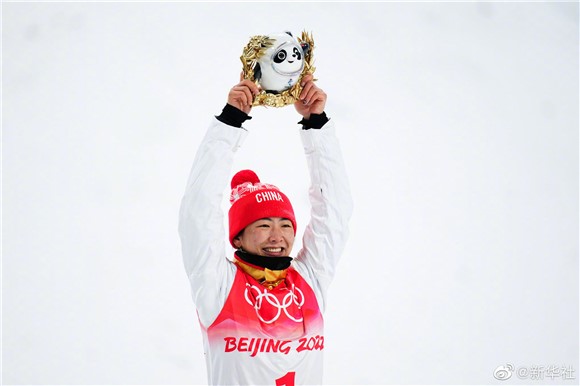 Xu Mengtao wins gold in the Freestyle Skiing Women’s Ariel’s final
Xu Mengtao wins gold in the Freestyle Skiing Women’s Ariel’s final
Behind the glory of the victory comes cutting-edge technology that supports the safety of the athlete. Xu, like many other winter sports athletes, has struggled with injuries in the past. The Sports Medicine Department of Peking University Third Hospital (PKUTH) worked to complete targeted surgeries and rehabilitation programmes for the Olympian, helping her quickly return to the arena.
As the only hospital in the country covering the three competition zones of Beijing, Yanqing and Zhangjiakou, PKUTH shouldered a lot of responsibility. To ensure a safe Olympics, hospital staff conducted intensive study and worked together closely to overcome different challenges regarding key medical technologies.
Since 2018, PKU Third Hospital has been awarded eight projects, including two specialities for the National Key Project “High-tech Olympics” (科技冬奥). These technological breakthroughs have greatly supported the medical teams in the Winter Olympics.
Smooth the passage to the hospital
The various injuries that can occur during the Winter Olympics are often serious and require immediate treatment, thus it is critical that the athletes get timely treatment. PKUTH uses artificial intelligence (AI) to identify, sort and arrange casualties for the safest possible transfer. The transfer is then supervised and uses real-time coordination to ensure that the injured are well-treated. 5G technology is used to collect and share information before patients arrive at the hospital.
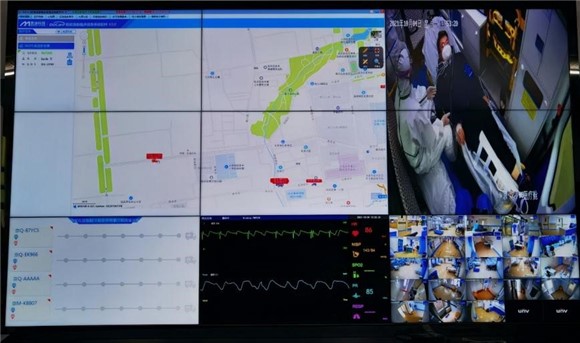 Sharing platform for medical information
Sharing platform for medical information
In less than 5 minutes after receiving a report about an injured athlete, the emergency rescue by air from the Genting Snow Park to PKUTH Chongli Branch could be accomplished; in less than 20 minutes, the team is able to transfer the athlete to an emergency room in the hospital. These all help earn valuable time in the treatment of the injured .
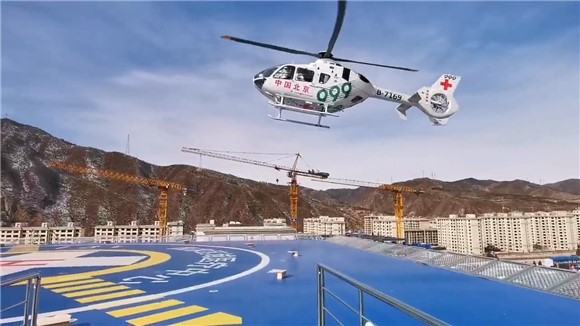 Emergency rescue by air at the Courtesy of Peking University Third Hospital
Emergency rescue by air at the Courtesy of Peking University Third Hospital
The entire first-aid procedure was highly efficient, allowing for early injury detection, diagnosis, transfer and treatment. This efficiency will no doubt serve as an example to future Olympic medical teams, especially in terms of resource allocation and service integration.
Cross-regional Integrated System For Emergency Rescue
Considering the uniqueness of emergency rescue, their previous experience in international sporting events, PKU Third Hospital led the research and development of the “Cross-regional Integrated Emergency Rescue System” (跨区域一体化应急医学救援体系研究).
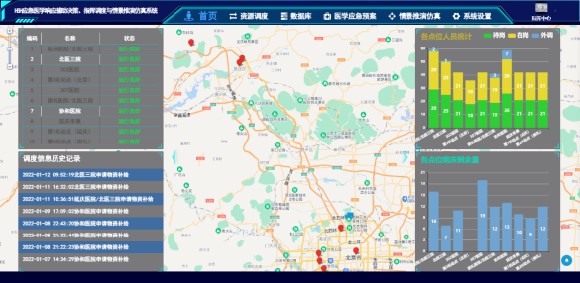 Emergency Medical Command and Dispatch System
Emergency Medical Command and Dispatch System
This special project was led by PKUTH Vice President Fu Wei . It revolved around the scientific problems of integration and homogeneity in first aid and medical rescues, and the development of a system to provide all-round support for the Winter Olympics. The study gathered 12 stand-out units in the different fields for cross-disciplinary cooperation and technological innovation.
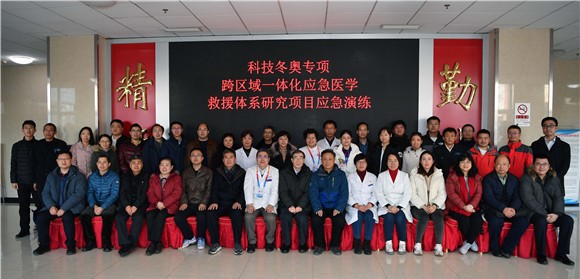 Group photo
Group photo
From managing medical resources, standardizing the diagnosis and treatment protocols, digitalizing psychiatric assessment and intervention, professional prevention, medical information sharing platforms, to training first aid personnel, PKU Third Hospital worked to ensure comprehensive first aid coverage during the Olympics.
 AR smart glasses (left) and smart ambulance system (right)
AR smart glasses (left) and smart ambulance system (right)
The system revolutionized the use of 5G, AR and VR technologies in emergency rescue situations as well as medical education and training, boosting the efficiency of training and ensuring that all members of the first aid team are equally equipped in their diagnosis and treatment abilities.
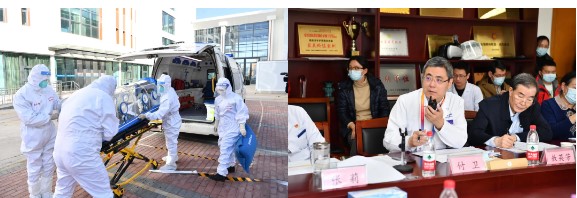 Training for the emergency rescue team
Training for the emergency rescue team
Before the Winter Olympics, PKU Third Hospital planned out many different first aid scenarios, especially focusing on COVID-19, and carried out drills thrice in Yanqing, Zhangjiakou and Beijing’s medical centers. Based on the research results from the drills, the team could then improve the emergency rescue plan to ensure its functionality and capability during the Olympics. The team drafted multiple possibilities of emergency scenarios to ensure that the cross-regional integrated system for emergency rescue was safe, reliable and highly efficient. These research results have been proved to be universally applicable, so future Winter Olympics may also benefit from them.
Advanced trauma prevention and treatment system
Professor Cui Guoqing of the PKUTH Sports Medicine Department headed the other special project, titled “The Establishment and Application of Trauma Prevention and Treatment System in the Winter Olympics”(冬奥会运动创伤防治和临床诊疗安全保障技术体系的建立与应用研究). As one of the first batch of projects granted by the “High-tech Olympics” National Key Program, the study focused on the application of first aid, diagnosis, treatment and rehabilitation. The study was a joint effort by the PKU Third Hospital’s departments of Sports Medicine, Orthopedic Trauma and Rehabilitation Medicine, in collaboration with 14 hospitals and research centers in the country.
As the leading scientist in the project, and the chief medical advisor for Team China’s Freestyle Ariel Skiing team, Professor Cui Guoqing has continued to be of service to many Olympic events. He also continues to explore the field of sports injury and prevention. Xu Mengtao was but one of many athletes who was treated by PKU Third Hospital, many others including Li Nina, Jia Zongyang were also treated here, enabling them to continue competing in the international arena.
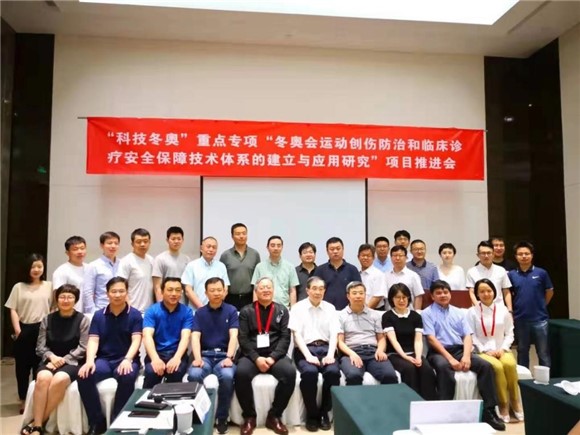 Group photo
Group photo
In the project, PKU Third Hospital developed a remote consultation system, breaking the bounds of space and time to provide timely medical aid.
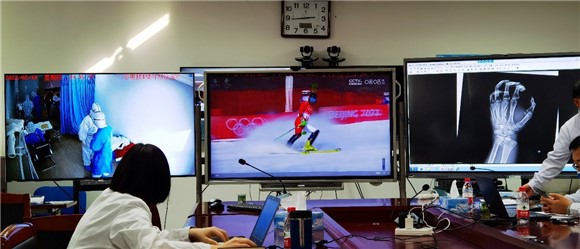 Remote first aid system
Remote first aid system
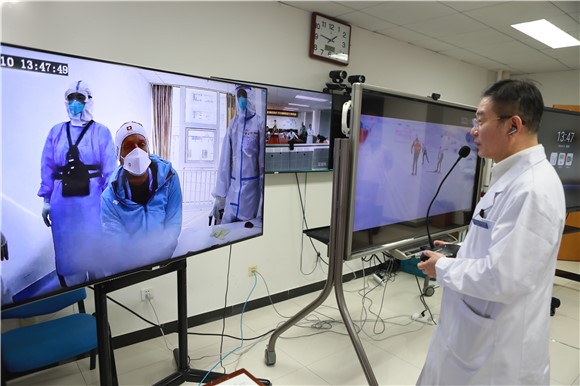 Doctor Zhou Fang using the remote consultation system
Doctor Zhou Fang using the remote consultation system
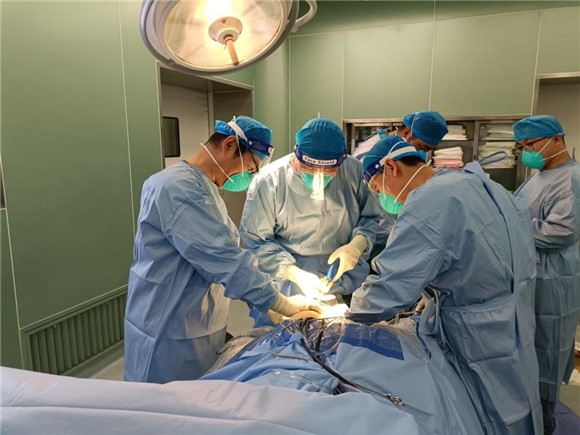 Minimally Invasive Surgery of Winter Sports injuries
Minimally Invasive Surgery of Winter Sports injuries
During the Winter Olympics, PKU Third Hospital completed many firsts. It performed the first athlete surgery, the first spinal fracture surgery, the first emergency rescue by air, providing efficient and dependable medical services to the Winter Olympians.
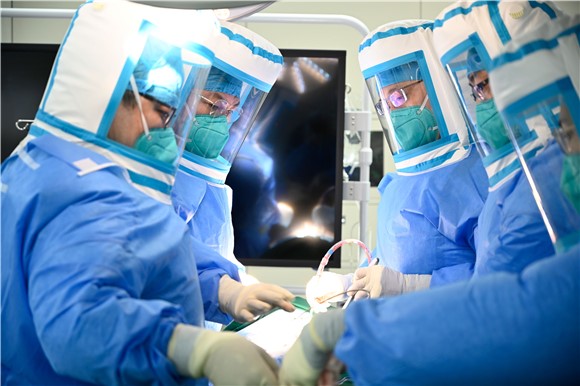 Winter Olympics athlete getting treatment
Winter Olympics athlete getting treatment
PKU Third Hospital has worked hard to safeguard the Winter Olympics with their medical technological innovations, and their scientific research will continue to benefit the community, aiding in the development of China’s winter sports.
Written by: Glenda
Edited by: Ye Yimeng
Source: PKU News (Chinese)











